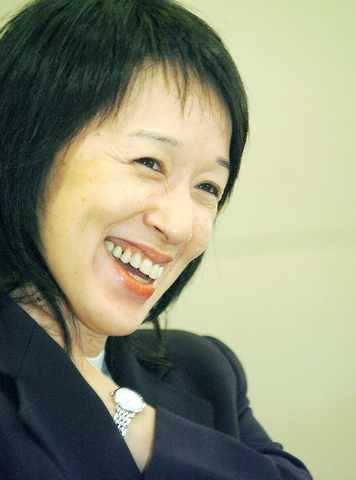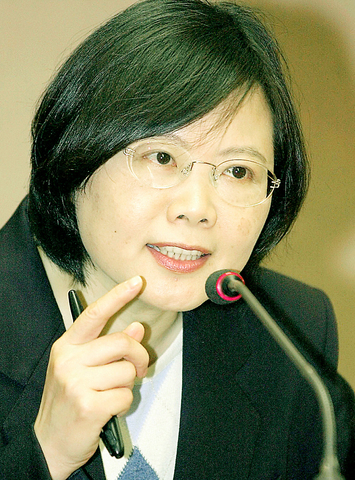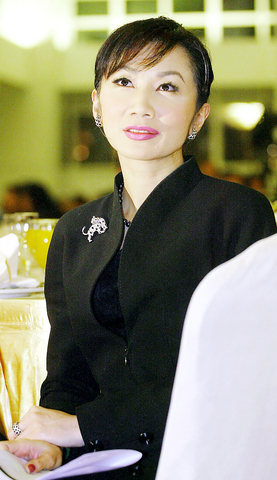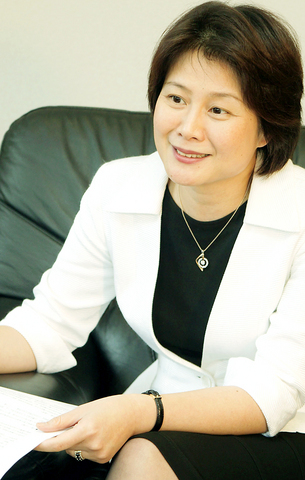Gender equality has come a long way in Taiwan since the early feminist movements of the late 1970s led by Lee Yuan-chen (
Lee launched the first women's magazine and women's organization, both called The Awakening, in 1979. But it wasn't until the cross-departmental Commission on Women's Rights Promotion under the Executive Yuan was established in 1997 that gender equality was actively promoted through policy.
The implementation of policies such as the Gender Equality in Employment Law (

PHOTOS: TAIPEI TIMES
While the number of women entering the workplace in Taiwan increases marginally each year, it remains among the lowest in Asia.
According to statistics from the Council of Labor Affairs, 47 percent of the female population 18 or older was part of the labor force in 2002. This was 2 percent lower than in Japan and 3 percent lower than in South Korea.
Politics is one place where women have a visual presence in Taiwan. The percentage of female representatives in Taipei and Kaohsiung was 33 and 23 percent in 2002, according to statistics from the Executive Yuan. Women also make up a quarter of currently serving cabinet members, the highest rate of participation in cabinet-level positions in Asia.

The politician
While there is strong female representation in the political arena, there is still only a small number of women in senior government positions, said Tsai Ing-wen (
"It's progressing but it's approaching the threshold when men will start to feel threatened by competition from women. When we reach that threshold, I feel there might be a set-back before we move on again," she said.

Tsai has previously served as Mainland Affairs Council (MAC) chairperson and National Security Council advisor, areas traditionally dominated by men.
Aware of the barriers faced by women in Taiwanese politics, at the end of the day she views herself as a professional politician whose life is not much different from that of her male counterparts.
"Politics is challenging and carries a lot of responsibility. But when you make the right decision and convince people to go along with that decision, then the achievement is extremely gratifying. This kind of pressure and achievement extends to male and female politicians," she said.

Her advice to women who want to enter the political battleground is to have patience, persistence and professionalism.
"I would say women are disadvantaged in the beginning because society is not yet fair to them. So one way to make them more competitive is to improve their professionalism. And there is no hurry; they should spend time to gain work experience and be mentally prepared for the environment they are entering," she said.
The arts administrator
Not all sectors have experienced dramatic changes over the decade, said deputy director of the National Palace Museum Lin Mun-lee (
"A lot of people believe women are more suited to work in the cultural arena. It is one reason why there is a high number of female employees in the field."
As the former National Culture and Arts Foundation chairperson and first female director of the Taipei Fine Arts Museum, she is respected in the art community by both administrators and artists.
Echoing Tsai's comment on the lack of female representation in senior positions, Lin said the majority of policy makers in the culture and arts departments are male.
"There are some roles in society that are male or female. At home I am a mother and a wife. At work I am a professional. To be honest I don't think about whether I am male or female. When I come to work I just do my job," Lin said.
As a young career woman, raising her children was an obstacle, but never a regret. Feeling as though she sacrificed nothing to get everything, Lin's advice to young career-minded women is: "Never give up on the things you want out of life. You can have both [career and family], but it's not easy. You'll have to work twice as hard," she said.
With a husband who shares household responsibilities, Lin admitted that her situation is somewhat exceptional in a traditional society that measures women's core value on their ability to be good housekeepers.
The businesswoman
As a mother and entrepreneur, Taiwan High Speed Rail Corp Chairperson Nita Ing (
Ranked 23rd on Fortune's list of most powerful international businesswomen, Ing's success in the business sector is constantly weighed against her competence as a single mother by a prying public eye.
"Taiwan is still a conservative society and women are not in an equal position with men. Men are excused from home life, it's acceptable for them to be too busy at work and be excused from their family responsibilities. ? The biggest obstacle facing women is the expectation to play several roles: mother, wife, daughter-in-law and professional and to play them all well," Ing said.
She acknoweldged a significant difference today from the situation 15 years ago when companies were hesitant to hire single women out of fear they might leave to get married and start families.
"There is less pressure to make that choice. Women have proven they are capable of having both. Over the years they earned a reputation for being as responsible and dependable as men. From my own experiences, the reactions from men now is that some of the best candidates for executive positions are women," she said.
As a second-generation industrialist, who took over her father's company, Ing said the challenges facing women in corporate business in Taiwan are less about gaining acceptance and more about the lack of opportunity.
"Most Taiwanese businesses are family run and traditionally top positions are reserved for the sons. ? I've had to work hard, but I am also in a more privileged position than other women."
The High-flyer
Close family ties also helped Diana Chen (
The youngest of the women interviewed, she is a relative newcomer to the business sector. Impecably groomed and clad in designer wear, the major adjustment for Chen was becoming an object of media obsession. And as a woman, she said her physical appearance receives more attention then her professional ability, pointing to the media's preoccupation with her decision to wear black clothing.
"I think it's difficult but not impossible to be a professional businesswoman and be feminine at the same time. The most important piece of advice I could offer young women is to be yourself. You should work hard, but also be sure to balance your career and personal life," she said.
More work to do
At present men still dominate Taiwan's political offices and boardrooms. But as more women enter the workforce, emphasis is being placed on government to provide childcare services for families where both parents choose careers.
"The government will have to do more than offer cash incentives to have more children if they want to increase the birth rate," said Garden of Hope Foundation CEO, Chi Hui-jung (
"If women are treated as equal at home and they are treated equally at work, the mental process of adjustment in terms of conflict between professional and domestic roles would be eased. And if women want to be treated equally they must also be prepared to take equal responsibility as well," Tsai said.

Taiwan has next to no political engagement in Myanmar, either with the ruling military junta nor the dozens of armed groups who’ve in the last five years taken over around two-thirds of the nation’s territory in a sprawling, patchwork civil war. But early last month, the leader of one relatively minor Burmese revolutionary faction, General Nerdah Bomya, who is also an alleged war criminal, made a low key visit to Taipei, where he met with a member of President William Lai’s (賴清德) staff, a retired Taiwanese military official and several academics. “I feel like Taiwan is a good example of

March 2 to March 8 Gunfire rang out along the shore of the frontline island of Lieyu (烈嶼) on a foggy afternoon on March 7, 1987. By the time it was over, about 20 unarmed Vietnamese refugees — men, women, elderly and children — were dead. They were hastily buried, followed by decades of silence. Months later, opposition politicians and journalists tried to uncover what had happened, but conflicting accounts only deepened the confusion. One version suggested that government troops had mistakenly killed their own operatives attempting to return home from Vietnam. The military maintained that the

Before the last section of the round-the-island railway was electrified, one old blue train still chugged back and forth between Pingtung County’s Fangliao (枋寮) and Taitung (台東) stations once a day. It was so slow, was so hot (it had no air conditioning) and covered such a short distance, that the low fare still failed to attract many riders. This relic of the past was finally retired when the South Link Line was fully electrified on Dec. 23, 2020. A wave of nostalgia surrounded the termination of the Ordinary Train service, as these train carriages had been in use for decades

Lori Sepich smoked for years and sometimes skipped taking her blood pressure medicine. But she never thought she’d have a heart attack. The possibility “just wasn’t registering with me,” said the 64-year-old from Memphis, Tennessee, who suffered two of them 13 years apart. She’s far from alone. More than 60 million women in the US live with cardiovascular disease, which includes heart disease as well as stroke, heart failure and atrial fibrillation. And despite the myth that heart attacks mostly strike men, women are vulnerable too. Overall in the US, 1 in 5 women dies of cardiovascular disease each year, 37,000 of them